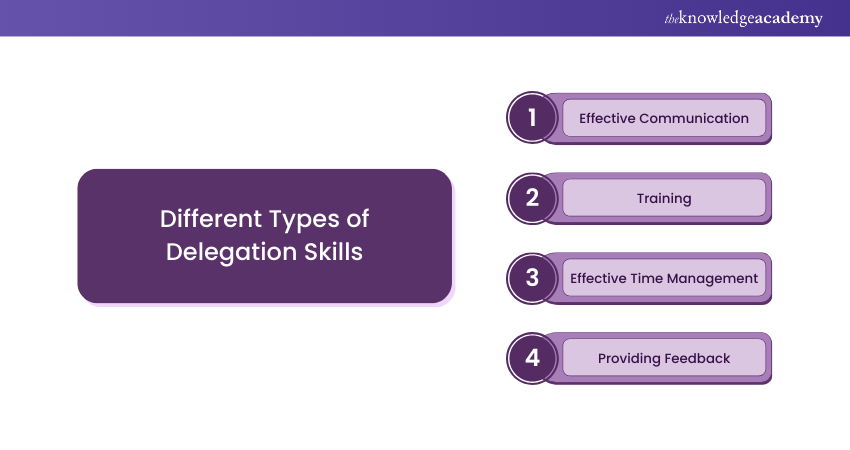We may not have the course you’re looking for. If you enquire or give us a call on + 1-866 272 8822 and speak to our training experts, we may still be able to help with your training requirements.
We ensure quality, budget-alignment, and timely delivery by our expert instructors.

Imagine a workplace where every task flows seamlessly, responsibilities are shared efficiently, and productivity reaches new heights. Sounds ideal, doesn’t it? The secret behind such a well-functioning team lies in Delegation Skills - the ability to assign tasks strategically while ensuring the best outcomes.
On the other hand, without strong Delegation Skills, even the most dedicated professionals can find themselves stuck in an endless cycle of overwork and inefficiency. That’s why mastering delegation is essential - not just for individual productivity but also for overall team success. In this blog, we’ll cover the different types of Delegation Skills, strategies to improve them, and practical ways to delegate responsibilities at work. Let’s get started!
Table of Contents
1) What are Delegation Skills?
2) Why is Learning How to Delegate Responsibilities Important?
3) Different Types of Delegation Skills
4) How to Improve Delegation Skills?
5) How to Delegate Responsibilities at Work?
6) What is a Good Example of Delegation?
7) What are the Three Pillars of Delegation?
8) Conclusion
What are Delegation Skills?
Delegation Skills involve assigning tasks to the right team members, clearly communicating expectations, and offering necessary support. Key skills include identifying tasks suitable for delegation, choosing the right person based on their strengths, and trusting them to complete the work.
Effective delegation also involves monitoring progress, offering feedback, and recognising team members' efforts. These skills help create a more efficient and motivated team, leading to better organisational outcomes. By mastering delegation, leaders empower their teams and foster a collaborative work environment.
Why is Learning How to Delegate Responsibilities Important?
Understanding how to delegate tasks is essential for several reasons:
1) Creates Learning Opportunities: Delegating tasks to team members can help them acquire new skills and gain experience, especially when the activities fall outside their typical responsibilities. This exposure to challenges can build resilience within the team.
2) Relieves Workload: Assigning tasks can help you manage your work more effectively and achieve a healthier work-life balance. This is particularly important when working with strict deadlines.
3) Increases Responsibility: Delegating tasks to teammates can foster a sense of responsibility, improving team morale. This increased responsibility can boost their confidence and sense of ownership.
4) Empowers Team Members: Successfully completing tasks can provide team members with a sense of accomplishment, inspiring them to perform better and increasing overall productivity.
Different Types of Delegation Skills
Here are the key types of Delegation Skills that can help you distribute tasks effectively while ensuring efficiency and accountability. Understanding these will enable you to delegate with clarity and confidence, fostering a more productive team environment.

1) Effective Communication
Effective Communication style is of utmost importance in Delegation. Managers need to make sure that they are effectively communicating the task objectives, deadlines, and priorities so that workers understand the expectations and their role in the team.
Effective communication needs Active Listening, as team leaders with this skill can solve any problems or questions that team members have at once.
2) Training
The delegation, more often than not, calls for leaders to ensure that their team members are well-trained and well-equipped with the required skills and expertise. This is executed by training the workers to perform various functions and delegate tasks effectively.
Training may be workshops, seminars, on-the-job training, or one-on-one mentorship programs based on the needs of the team's members.
3) Efficient Time Management
To delegate is to manage time so that all important tasks can be assigned priority and executed in the most efficient manner. This is the ability to prioritise the tasks, considering the urgency and importance, and delegating accordingly to the given deadlines without compromising the quality.
Ensuring proper Time Management helps leaders focus on their strategic mission, delegating routine tasks to their teammates.
4) Providing Feedback
Top leaders are proud of giving their subordinates proper evaluation of their work. It entails sharing knowledge, congratulating workers, and picking out weak point synergy. By providing feedback, leaders help their teammates live up to their potential and create a learning environment where improvement never ends.
How to Improve Delegation Skills?
Here are the different ways to improve Delegation Skills:
1) Self-evaluate
a) Evaluate your current Delegation Skills to identify areas for improvement.
b) Determine which qualities you excel at, such as communication.
c) Identify areas that need enhancement, like providing constructive feedback.
d) Seek feedback from friends, colleagues, or mentors to gain a comprehensive understanding of your abilities.
2) Engage in Learning and Training
a) Register in online courses and training programs that focus on effective delegation strategies.
b) These programs often offer flexible learning schedules and practical strategies.
c) Encourage your team to take courses that provide insights into completing delegated tasks.
d) For instance, consider programs like the Authority Delegation Training offered by the federal government.
3) Observe Successful Leaders
a) Observe how effective leaders in your workplace delegate tasks.
b) Improve your skills by watching HR managers conduct onboarding sessions, for example.
c) Find a mentor who excels in delegation and has a successful career to guide you.
d) Learn their techniques and apply them to your own delegation practices.
4) Adopt a Delegative Leadership Style
a) Assess your team’s unique talents and assign responsibilities accordingly.
b) Adopting this leadership style helps create a positive work environment.
c) Identify strengths within your team and delegate tasks based on those strengths.
d) Foster collaboration and effective leadership by leveraging your team’s abilities.
Enhance your Delegation Skills by registering for Leadership Courses now!
How to Delegate Responsibilities at Work?
Here are the steps to effectively delegate responsibilities at work:

1) Identify Tasks to Delegate
a) Decide which project aspects can be delegated.
b) Assign tasks that team members can handle better, or that will help them advance their careers.
c) Delegate tasks requiring less supervision.
2) Communicate the Project's Goal
a) Ensure all team members understand the project's objective.
b) Define the desired outcome and explain methods for measuring success.
3) Recognise Team Strengths
a) Delegate tasks based on team members' strengths.
b) Maintain fairness while assigning responsibilities.
c) Match time-sensitive tasks with team members who can complete them quickly.
4) Provide Adequate Notice
a) Discuss tasks with team members in advance.
b) Explain why you are delegating tasks and why specific members were chosen.
5) Give Clear Instructions
a) Describe the tasks and the steps required for completion.
b) Clearly explain policies, procedures, and the reporting structure.
c) Provide necessary resources.
6) Offer Support and Show Appreciation
a) Establish a communication channel for clarifying issues.
b) Provide genuine feedback and recommendations.
c) Show appreciation through public recognition, thank-you notes, or personal commendations.
Supervise teams with confidence and skill by registering in Introduction to Supervising a Team – sign up today!
What is a Good Example of Delegation?
A Manager assigns a team member to lead a project meeting. This empowers the team members, leverages their strengths, and allows the manager to focus on more strategic tasks, fostering overall team efficiency and growth.
What are the Three Pillars of Delegation?
Here are the three pillars of delegation in points:
a) Trust: Have confidence in your team's abilities to handle tasks.
b) Communication: Clearly convey expectations and objectives
c) Support: Provide necessary resources and assistance to ensure task completion
Conclusion
Mastering Delegation Skills enhances productivity, builds trust, and fosters team growth. Understanding its types and applying effective strategies ensures efficiency while empowering others. Embrace delegation as a leadership tool to drive success and collaboration. Done right, it’s not just task-sharing - it’s unlocking potential and inspiring excellence.
Improve your Leadership presence through our Executive Leadership Presence Training – sign up today!
Frequently Asked Questions
What are the Four Cs of Delegation?

The four Cs of Delegation are:
1) Clarity: Clearly define tasks and expectations.
2) Competence: Ensure the delegate has the necessary skills.
3) Commitment: Gain commitment from the delegate.
4) Control: Maintain control by monitoring progress.
What are the Four Phases of Delegation?

Here are the four phases of Delegation:
1) Assignment: Assign the task.
2) Instruction: Provide clear instructions.
3) Support: Offer necessary support and resources.
4) Evaluation: Evaluate performance and provide feedback.
What are the other resources and offers provided by The Knowledge Academy?

The Knowledge Academy takes global learning to new heights, offering over 3,000 online courses across 490+ locations in 190+ countries. This expansive reach ensures accessibility and convenience for learners worldwide.
Alongside our diverse Online Course Catalogue, encompassing 19 major categories, we go the extra mile by providing a plethora of free educational Online Resources like News updates, Blogs, videos, webinars, and interview questions. Tailoring learning experiences further, professionals can maximise value with customisable Course Bundles of TKA.
What is the Knowledge Pass, and how does it work?

The Knowledge Academy’s Knowledge Pass, a prepaid voucher, adds another layer of flexibility, allowing course bookings over a 12-month period. Join us on a journey where education knows no bounds.
What are related Courses and blogs provided by The Knowledge Academy?

The Knowledge Academy offers various Leadership Courses, including Leadership Skills Course, Introduction to Supervising a Team Course and Managing Innovation Course. These courses cater to different skill levels, providing comprehensive insights into Analytical Skills.
Our Business Skills Blogs cover a range of topics offering valuable resources, best practices, and industry insights. Whether you are a beginner or looking to advance your Business Improvement skills, The Knowledge Academy's diverse courses and informative blogs have you covered.
Upcoming Batches & Dates
Date







 Top Rated Course
Top Rated Course



 If you wish to make any changes to your course, please
If you wish to make any changes to your course, please


